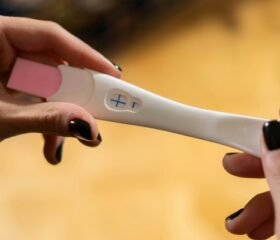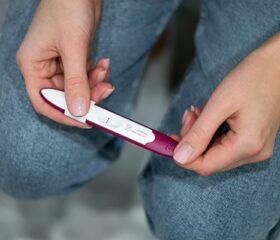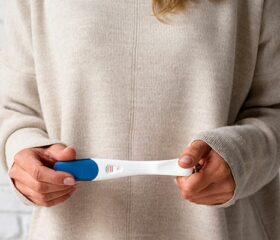Why Do You Have a Late Period and a Negative Pregnancy Test?
A late period paired with a negative pregnancy test is an unusual (and potentially confusing) combination, but it isn’t unheard of.

The first question that crosses your mind when you miss your period is probably “am I pregnant?”, and the natural reaction is to take a pregnancy test and expect a positive result. But what does it mean if the test comes back negative?
Below, we’ll explore the possibilities behind this scenario and explain what exactly could be happening.
Can you be pregnant if your pregnancy test is negative?
Yes, you can be pregnant even if your pregnancy test is negative.
By and large, pregnancy tests are very reliable—they have an accuracy rate of 97%–99% under normal circumstances. 1 Put another way, the odds of a test failing are 1%–3%. That’s a low chance, but it isn’t zero.
It’s also possible to get a false negative pregnancy test if you use the test incorrectly or, rarely, if there’s something unusual going on in your body. We’ll elaborate on these scenarios that can lead to a false negative below:
You used the test incorrectly
This is the most common reason for a false negative result on a pregnancy test. It’s relatively easy to accidentally use an expired test or to simply test for pregnancy too early.
Home pregnancy test strips and digital tests work by detecting human chorionic gonadotropin (hCG), a hormone your body produces shortly after implantation occurs (when a fertilized egg attaches to the uterine wall). 1
If you have a normal 28-day menstrual cycle, your hCG levels will typically be high enough for an at-home pregnancy test to pick up about 12–15 days after you ovulate. 1 This is right around when your period would have normally been due. Testing before that can lead to a false negative result.
If you suspect you might be pregnant (e.g., you notice pregnancy symptoms like fatigue or light spotting) but receive a negative result, the best course of action is to simply wait a few days to a week and retest. Remember to double-check your pregnancy test’s expiration date and follow its instructions carefully when you do so.
You have an unusual hCG level
The following scenarios are less likely, but it’s good to be aware of them. In rare cases, hCG might be undetectable by pregnancy tests because you have:
- A multiple pregnancy: If you have extremely high levels of hCG, it could be a sign that you’re carrying twins or more. 1 It doesn’t happen very often, but very high hCG levels can sometimes overwhelm at-home tests and lead to false negative results. This is referred to as the hook effect. 2
- An ectopic pregnancy: This is a more dangerous possibility. Ectopic pregnancy is a rare but serious condition where a fertilized egg implants outside your uterus (often in your fallopian tube). 3 This can mess with your hCG levels, making it harder for a standard home test to detect them. 1 If you have an ectopic pregnancy, you may also experience severe pain or mild cramping on one side of your pelvis. 4
If you think you might be carrying multiples (e.g., you have a family history of having twins) or feel any discomfort, see a doctor right away. They can test you for both of these possibilities and give you appropriate care if you’re in either of those scenarios.
What can cause a late period if you’re not pregnant?
If you’ve confirmed you’re not pregnant (e.g., by taking multiple tests over the course of a few weeks) but your period still hasn’t come, it’s time to look into other factors that may be disrupting your menstrual cycle.
Sometimes, certain lifestyle changes, such as taking medication or even traveling, can delay your period.
Certain medical conditions can also impact your period, although you’ll usually also notice other symptoms if that’s the case.
Lifestyle changes that can affect your period
In most cases, it won’t be a serious health issue that’s delaying your period, just a change in your lifestyle. Here are some common culprits:
- Stress: If you’re constantly under stress, your body may release cortisol (also known as the stress hormone). This can interfere with the other hormones that are responsible for ovulation and delay your period. 5 6
- Sudden routine changes: Your body thrives on routine. Major shifts like starting an intense exercise regimen, beginning to work overnight shifts, or even travel can confuse your internal clock and lead to irregular periods. 7
- Weight fluctuations: Both significant weight loss and gain can disrupt your menstrual cycle. Your body needs a certain amount of fat to produce the hormones necessary for menstruation, and extreme changes can throw this delicate balance off. 8 9
- Fertility treatments: Undergoing fertility treatments like in vitro fertilization (IVF) involves intensive hormonal manipulation to stimulate egg production and prepare your body for pregnancy. 10 This can affect your cycle and cause you to miss your period.
- Contraception: Certain hormonal contraception methods, such as hormonal IUDs and contraceptive injections, can affect your period flow, making it lighter or even cause it to disappear. Using birth control pills, patches, or rings continuously for a long time can also lead to missed periods. 5
- Other medications: Some non-contraceptive medications, such as antipsychotics, can also interfere with your menstrual cycle. 7 Check with your doctor if you’re not sure about the side effects of any medications you’re on.
- Breastfeeding: Your period typically won’t return immediately if you’ve recently given birth and are breastfeeding, so don’t fret if you miss your period postpartum. Exactly when you’ll get your first period after giving birth varies for each woman. While some take just a few months, others have to wait until they finish breastfeeding. 8
Take a moment to reflect on any recent significant changes in your life and consider using a journal or period tracker app to record these changes going forward. Sometimes, just addressing those factors can help your cycle return to normal.
That being said, if you end up missing three periods in a row (provided that you’re not pregnant or breastfeeding), you should see a doctor to see what’s going on. 8
Medical conditions that can affect your period
Some medical conditions can cause hormonal imbalances and affect your menstrual cycle. These include:
- Polycystic ovary syndrome (PCOS): Other PCOS symptoms include excessive hair on parts of your body, weight gain, severe acne, and patches of dark, thickened skin. 8 11
- Thyroid disease: Your thyroid gland plays a crucial role in regulating your metabolism and hormone production. An overactive thyroid (hyperthyroidism) can lead to irregular or missed periods, a faster heart rate, sleep issues, weight loss, sensitivity to heat, sweaty skin, or anxiety and irritability. 5 12
- Perimenopause: This is the natural transitional phase leading up to menopause. It typically occurs when you’re in your mid- to late 40s, although it can start earlier if you have a smoking habit, a family history of premature menopause, or certain medical conditions. Those going through perimenopause may also have hot flashes or trouble sleeping. 13 14
If you notice any of those symptoms, report them to your doctor. Of course, if you experience other significant discomfort we didn’t mention here, you should also seek medical attention.
What to know about phantom pregnancies
Sometimes, you can become so convinced that you’re pregnant that you’ll experience early pregnancy symptoms (including a missed period) without actually carrying a baby. This is known as a phantom pregnancy, and it can happen whether you’re trying to conceive or actively avoiding it.
If your doctor rules out an actual pregnancy, they’ll check that there isn’t an underlying medical condition that’s causing your symptoms. If not, they’ll probably refer you to a mental health professional for treatment.
Final thoughts
A late period coupled with a negative pregnancy test can understandably lead to anxiety. If you really aren’t pregnant, there’s a good chance your erratic cycle is benign caused by fixable health or lifestyle factors. There’s also a good chance a baby is on board, and you’ll get a positive test soon.
Before jumping to any conclusions, try testing again in a few days so that you can make an informed decision about your next step.
Article Sources
- MedlinePlus. "Pregnancy Test" Retrieved June 11, 2025.
- Cureus. "False Negative Urine Pregnancy Test: Hook Effect Revealed" Retrieved June 11, 2025.
- StatPearls. "Ectopic Pregnancy" Retrieved June 11, 2025.
- MedlinePlus. "Ectopic pregnancy" Retrieved June 11, 2025.
- Wexner Medical Center. "Is it normal to miss periods?" Retrieved June 11, 2025.
- MedlinePlus. "Cortisol Test" Retrieved June 11, 2025.
- Vital Record. "9 reasons your period is late (if you’re not pregnant)" Retrieved June 11, 2025.
- Office on Women's Health. "Period problems" Retrieved June 11, 2025.
- Apple Women’s Health Study. "Menstrual cycles today: how menstrual cycles vary by age, weight, race, and ethnicity" Retrieved June 11, 2025.
- MedlinePlus. "In vitro fertilization (IVF)" Retrieved June 11, 2025.
- MedlinePlus. "Polycystic Ovary Syndrome" Retrieved June 11, 2025.
- Cleveland Clinic. "Thyroid Disease" Retrieved June 11, 2025.
- Office on Women's Health. "Menopause basics" Retrieved June 11, 2025.
- Office on Women's Health. "Early or premature menopause" Retrieved June 11, 2025.







